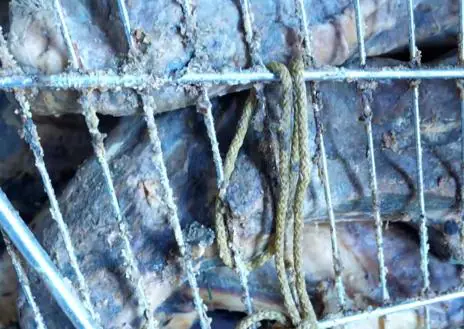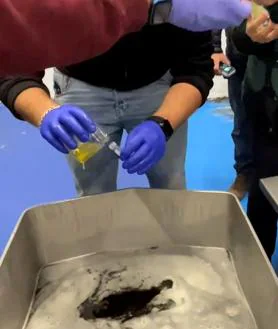The Civil Guard has arrested 32 people and is investigating another 21 as allegedly responsible for crimes against industrial property, fraud, food fraud, document falsification and against the public health. Among other actions, those involved passed off inferior quality oils as extra virgin olive oils or relabeled products that had already expired.
Specifically, the Civil Guard has initiated 12 individual operations within the framework of the OPSON XIII macro operation against food fraud, as reported this Sunday in a statement. In total, the agents have carried out more than 3,000 inspections and records in distribution centers, warehouses, means of transportation, ports and airports in the national territory, in which up to 2,000 administrative infractions.
This is a European macro-operation whose specific action on attacks on Denomination of Origin and Geographical Indications products has been led by the Civil Guard, which has organized a coordination meeting in Alicante together with other European authorities, such as EUIPO and Europol.
The operation has focused on counterfeit (or substandard) food and alcohol, illegal food supply chains, food fraud, food safety and financially motivated adulteration.
104 arrest warrants throughout Europe
104 ARRESTS ORDERS ACROSS EUROPE
At European level, the police forces of the 29 participating countries have issued 104 arrest warrants, carrying out up to 184 search warrants. In addition, a total of 278 people have been reported and 11 criminal organizations have been dismantled.
Researchers across Europe have noticed a continuing trend in sale of expired foodafter attracting waste disposal companies, have masses of food in their hands to be destroyed, which subsequently erase and reprint the expiration dates and attach the new labels reintroducing the expired products into the supply chain again. The most affected products have been olive oil and wines with protected designation of origin (DOP).
The OPSON operation has had the collaboration of the competent Ministries of the different Autonomous Communities, the General Directorate of the Food Industry (DGIA) and the General Subdirectorate of Food Quality Control and Food Laboratories of the Ministry of Agriculture, Fisheries and Food ( MAPA) and the Spanish Agency for Food Safety and Nutrition (AESAN) dependent on the Ministry of Consumer Affairs. All of them work in coordination with the European Food Safety Authority (EUROPEAN FOOD SAFETY AUTHORITY – EFSA), providing scientific advice and communicating existing and emerging risks associated with the food chain.
Performances in La Rioja, Madrid, Valencia, Seville and Malaga
Among the notable actions, the Organic Unit of the Judicial Police, with the collaboration of Europol and the Carabineri Arm of Italy, managed to seize some 120,000 canned tuna and 45,000 liters of oilas well as the arrest of four people.
The detainees, owners of a canning company in Alfaro, in La Rioja, made the canned tuna of lower quality than what appeared on the labeling, as well as with sunflower or pomace oil when it appeared as olive oil, with which they were able to sell the products at prices much lower than the competition.
For its part, Seprona of Madrid, in collaboration with the health authorities of the Community, achieved the immobilization and subsequent destruction of 642 five-liter jugs of oil, 104 hams and 207 cheesesas well as the arrest of one person and four others investigated for crimes against public health, fraud, document falsification, related to industrial property and the consumer market.
From a warehouse in Valdemoro (Madrid), they marketed oil made from seed mixtures, passing it off as EVOO and mild oil. Iberian cured hams and cheeses without being able to prove its traceability.


Also, Seprona of Valencia and in collaboration with the Ministry of Health of the Generalitat investigated a pickle company that offered products for sale that were not suitable for consumption and the addition of colorants and preservatives that were not in accordance with the regulatory regulations on the matter. They were immobilized at the company’s facilities. 80,000 kilograms of productmuch of which was stored and packaged, ready for sale and consumption.
Due to these events, the company manager was arrested for alleged crimes against public health and related to the market and consumers.
In Seville, Seprona inspected establishments dedicated to the production and distribution of frozen fish products, where workers were relabeling two pallets of frozen cod loins whose expiration date had expired. Due to these events, seven people have been investigated and a total of 45,320.33 kilos of frozen products whose labeling had been modified.
In the capital of Seville, a criminal group dedicated to the distribution of extra virgin olive oil adulterated with other types of oil such as sunflower, seed or lampante oil. Here 11 people have been arrested and six are being investigated, seizing 20,000 liters of fake EVOO.
Finally, the judicial police of Coin, in Malaga, have arrested eight people, dismantling a criminal organization in which packaging and labeling machinery was seized, as well as 1,800 kilos of refrigerated and frozen food products, poorly preserved, unlabeled or expired, such as sausages hams, salmon, pizzas or eggs.
to these foods the expiration label was removed or they erased it to distribute them to their clients, they also packaged, labeled, classified and distributed eggs by modifying their expiration date.
#International #macrooperation #food #fraud #arrested #investigated #Spain #tons #illicit #products

